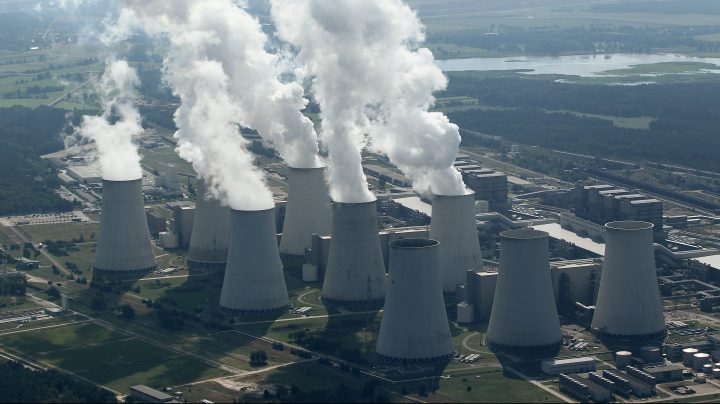
Occidental Petroleum makes a $1.1 billion bet on carbon capture technology
Occidental Petroleum makes a $1.1 billion bet on carbon capture technology

Last week, U.S. oil and gas producer Occidental Petroleum struck a deal to pay more than $1 billion for a technology company, Carbon Engineering, that works on capturing carbon dioxide from the atmosphere. This “direct air capture” technology as it’s called has been seen by both industry and the U.S. government as a promising solution for fighting climate change.
Vijay Vaitheeswaran, global energy and climate innovation editor at The Economist, has been following this technology and the companies pursuing it for years. He spoke about this most recent development with “Marketplace Morning Report” host Sabri Ben-Achour. The following is an edited transcript of their conversation.
Sabri Ben-Achour: Just to start, can you briefly explain how this technology works? So it’s like a vacuum cleaner, basically, that sucks carbon out of the air?
Vijay Vaitheeswaran: You know, that’s actually as good a description as anyone’s come up for it. In effect, the carbon dioxide that’s in the air is very dispersed, it’s hard to capture. But we have come up with a few technologies that can suck it out of the air using chemicals. And then you can store it in the ground permanently, which would be the ideal solution. Or maybe you can use it to make fizzy drinks, or other industrial purposes.
Ben-Achour: So the firm that Occidental is acquiring is called Carbon Engineering. And you apparently actually visited one of their pilot projects some time back. What did that look like?
Vaitheeswaran: Yeah, Carbon Engineering is a really interesting company. It’s backed by Bill Gates and has been for a while. I’ve been tracking this for over 15 years. And I went up to a place outside of Vancouver where they have a pilot plant that they’d been working on for a number of years. Based on that they were able to get a billion dollar project approval, in which Occidental, the big American oil company in which Warren Buffett has an investment, has decided to support them scaling this up in Texas. That’s the launch of a project that I attended, in a place called Notrees, Texas, in the Permian Basin, where America’s oil patch is.
Ben-Achour: Can you give us a sense of the scale of investment, both by the federal government and the private sector, into this particular technology?
Vaitheeswaran: First, just to give a sense of perspective here: This is one tool in the toolkit. Nobody suggests that direct air capture will solve our climate change problem. And it’s ridiculous to think that. On the other hand, the UN’s scientific experts at the intergovernmental panel, IPCC, they argue that we need negative emissions technologies by 2050 if we’re going to deal with the century’s climate problems. A couple of streams of revenue have come into this. One of them, of course, is startup capital. But we have big money coming in from the oil industry. But the U.S. government has just given a massive grant [of] $1.2 billion for, specifically, this topic. So real money, going into pilot phase projects that are ready to scale up to commercial level.
Ben-Achour: This technology has gotten some criticism — environmentalists who criticize Occidental and other oil companies for investing in this, basically saying it’s just an excuse for them to keep on pumping oil. Are those fair?
Vaitheeswaran: It’s only right to be skeptical when an oil company says, “Hey, we’re gonna do this nice thing, and so we can keep pumping oil.” By all means. However, the problem we have with climate change is so enormous, that just having lots more windmills and Teslas might make us feel good, but it isn’t enough to solve the problem. And so I think there’s proper scientific grounds to say, whoever wants to invest in this, let’s welcome the investment.
There’s a lot happening in the world. Through it all, Marketplace is here for you.
You rely on Marketplace to break down the world’s events and tell you how it affects you in a fact-based, approachable way. We rely on your financial support to keep making that possible.
Your donation today powers the independent journalism that you rely on. For just $5/month, you can help sustain Marketplace so we can keep reporting on the things that matter to you.

















